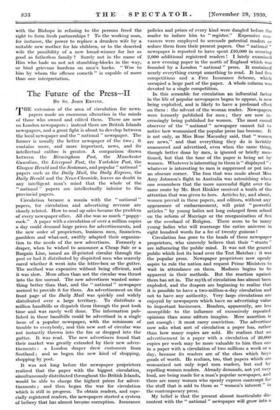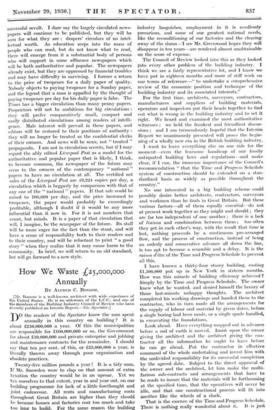The Future of the Press—II
BY ST. JOHN ERVINE.
THE extension of the area of circulation for news- papers made an enormous alteration in the minds of those who owned and edited them. There are now no London newspapers ; instead there are British Islands newspapers, and a great fight is about to develop between the local newspaper and the " national" newspaper. The former is usually the better newspaper of the two ; it contains more, and more important, news, and its intellectual calibre is greater. A comparison drawn between the Birmingham Post, the Manchester Guardian, the Liverpool Post, the Yorkshire Post, the Glasgow Herald and the Scotsman, and popular" national" papers such as the Daily Mail, the Daily Express, the Daily Herald and the News-Chronicle, leaves no doubt in any intelligent man's mind that the whole of the " national " papers are intellectually inferior to the provincial papers.
Circulation became a mania with the " national " papers, for circulation and advertising revenue are closely related. How to send up sales became the problem of every newspaper office. All else was so much "poppy- cock." A paper with a circulation of over a million copies a day could demand large prices for advertisements, and the new order of proprietors, business men, financiers, gamblers and what-not, swiftly adapted their organiza- tion to the needs of the new advertisers. Formerly a draper, when he wished to announce a Cheap Sale or a Bargain Line, issued an ill-printed circular through the post or had it distributed by dispirited men who scarcely cared whether it went into the letter-box or the gutter. The method was expensive without being efficient, and it was slow. More often than not the circular was thrust into the fire unread. The new advertisers wanted some- thing better than that, and the " national " newspaper seemed to provide it for them. An advertisement on the front page of the Daily Mail was quickly and widely distributed over a large territory. To distribute a- million handbills or dispatch them through the post took time and was rarely well done. The information pub- lished in these handbills could be advertised in a single issue of a popular newspaper, with the minimum of trouble to everybody, and this new sort of circular was not instantly thrown into the fire or dropped into the gutter. It was read. The new advertisers found that their market was greatly extended by their new adver- tisements: a London draper drew customers from Scotland ; and so began the new kind of shopping, shopping by post.
It was not long before the newspaper proprietors realized that the paper with the biggest circulation, simultaneously distributed throughout the British Islands, would be able to charge the highest prices for adver- tisements; and then began the war for circulation which is still in progress. To obtain readers, and espe- cially registered readers, the newspapers started a system of bribery that has almost become corruption. Insurance policies and prizes of every kind were dangled before the reader to induce him to "register." Expensive can- vassers were employed to serenade potential readers or seduce them from their present papers. One " national " newspaper is reported to have spent £10,000 in securing 2,000 additional registered readers ! I lately examined a new evening paper in the north of England which was founded by a London " national" press. It contained
nearly everything except something to read. It had five competitions and a Free Insurance Schemer which occupied a large part of the paper. A whole column was devoted to a single competition.
• In this scramble for circulation an influential factor in the life of popular newspapers began to appear, is now being exploited, and is likely to have a profound effect on them : the advent of the woman reader. Newspapers were formerly published for men ; they are now in- creasingly being published for women. The most casual observer of the " national " newspaper cannot fail to notice how womanised the popular press has become. It is not only, as Miss Rose Macaulay said, that "women are news," and that everything they do is lavishly announced and advertised, even when the same thing, though better done by men, is ignored or briefly men- tioned, but that the tone of the paper is being set by women. Whatever is interesting to them is " displayed": whatever is interesting to men is suppressed or put into an obscure corner. The fuss that was made about Miss Amy Johnson's flight to Australia was astonishing when one remembers that the more successful flight over the
same route by Mr. Bert Hinkler received a tenth of the attention that was given to hers. Articles by, and about,
women prevail in these papers, and editors, without any appearance of embarrassment, will print "powerful articles" by young ladies not long enlarged from school on the reform of Marriage or the reorganization of Sex or the overhaul of Religion. There seem to be many young ladies who will rearrange the entire universe in eight hundred words for a fee of twenty guineas !
Circulation has gone to the heads of these newspaper proprietors, who sincerely believe that their " stunts " are influencing the public mind. It was not the general public which lost its head over the Test Matches : it was the popular press. Newspaper proprietors now openly aspire to rule the nation and request Prime Ministers to
wait in attendance on them. Madness begins to be apparent in their methods. But the reaction against
them has set in. The myth of circulation has almost been exploded, and the drapers are beginning to realize that it is possible to have a two-million-a-day circulation and not to have any authority. Very large circulations are enjoyed by newspapers which have no advertising value to important businesses. Readers, apparently, are less susceptible to the influence of excessively repeated opinions than somel editors imagine. Mere assertion is not enough : it must carry conviction. The advertiser now asks what sort of circulation a paper has, rather than how many copies are sold. He realizes that an advertisement in a paper with a circulation of 20,000
copies per week may be more valuable to him than one in a paper with a circulation of two millions a week or a day, because its readers are of the class which buys goods of worth. He realizes, too, that papers which are womanized not only repel men readers, but end by repelling women readers. Already demands, not yet very loud, are being made for a man's popular newspaper, and there are many women who openly express contempt for the stuff that is sold to them as "women's interest" in the contemporary press.
My belief is that the present almost inarticulate dis- content with the " national " newspaper will grow into
successful revolt. I dare say the largely circulated news- papers will continue to be published, but they will be seen for what they are : drapers' circulars of no intel- lectual worth. As education seeps into the mass of people who can read, but do not know what to read, there will emerge from it a substantial body of persons who will support in some affluence newspapers which will be both authoritative and popular. The newspapers already exist, but they are oppressed by financial troubles and may have difficulty in surviving. I foresee a return to the price of twopence for a daily paper of quality. Nobody objects to paying twopence for a Sunday paper, and the legend that a man is appalled by the thought of paying twopence per day for his daily paper is false. The Times has a bigger circulation than many penny papers. Proprietors will not be ambitious for big circulations : they will prefer comparatively small, compact and easily distributed circulations among readers of intelli- gence. Male interest will prevail in these papers, and editors will be restored to their positions of authority : they will no longer be treated as the confidential clerks of their owners. And news will be news, not " treated " propaganda. I am not in circulation secrets, but if I may regard the ably edited Liverpool Post as a model for the authoritative and popular paper that is likely, I think, to become common, the newspaper of the future may seem to the owners of the contemporary " national " papers to have no circulation at all. The certified net sales of the Liverpool Post are 49,224 copies per day, a circulation which is beggarly by comparison with that of any one of the " national " papers. If that sale could be raised to 100,000 per day, and the price increased to twopence, the paper would probably be exceedingly profitable, although I doubt if it would be any more influential than it now is. For it is not numbers that count, but minds. It is a paper of that circulation that will, I imagine, be the newspaper of the future. Its staff will be more eager for the fact than the stunt, and will have a sense of responsibility both to their readers and to their country, and will be reluctant to print "a good story" when they realize that it may cause harm to the community. In brief, we will return to an old standard, but will go forward to a new style.











































 Previous page
Previous page